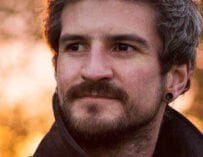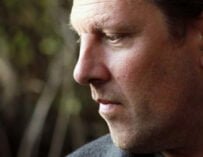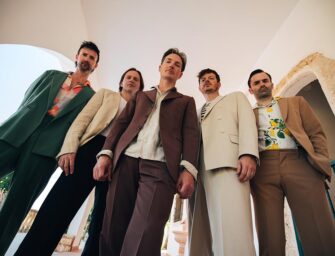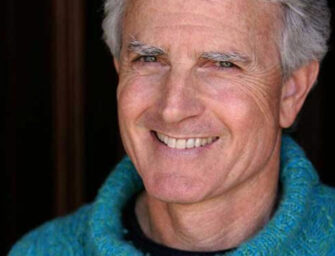
DMA’S Johnny Took: “We write, collaborate and put parts together to make them flow and turn them into songs.”
With new album ‘The Glow’ looking likely to be their most successful yet, we chat with Tommy, Mason and Johnny
With two distinct studio albums and a live release already under their belts, third studio record The Glow encapsulates DMA’S at their finest. A ferocious statement packed with ambition and vitality, this new collection of songs sees the Sydney trio fulfil their potential and some. Joyously diverse to the core, it’s a true melting pot of sound, a place where echoes of Primal Scream’s Screamadelica encounter sparkling alt-pop, eliminating any genre-boundaries in the process.
The record also represents their first big international studio experience. Recorded in London, Los Angeles and Sydney, Tommy O’Dell, Matt Mason (known as Mason) and Johnny Took worked with Grammy-winning producer Stuart Price (Madonna, The Killers, New Order) in order to take their hooks and anthemic sound to a whole new level.
We caught up with the trio to find out more about the new album and get some insider tips on collaborative writing…
DMA’S have come a long way. Have you changed the way you write songs?
Tommy O’Dell: “It hasn’t really changed, it’s the same as when we made the first EP. We provide different parts and bring them together. Johnny sometimes writes full songs. For other songs, we’ll try different things, but we always have a similar approach. This album wasn’t so much the approach to writing, it was more the approach to recording we wanted to change. You can hear it in Life Is A Game Of Changing, etc. It was one of the more difficult albums we made as far as song selection goes and what we wanted to do production-wise.”
The Glow has a vibrant feel. Was it time to approach things differently?
Johnny Took: “I think we just wanted to try something different, it was a natural progression. If you’ve grown up your whole life with guitar music and playing guitars and just started experimenting with stuff… We’ve still got guitars on a pop record, but it’s about incorporating more elements. I wanted to write a couple to put in the live set.
“You learn a lot from every record, particularly when you’re two down. There are things you want to try. Working with Scott Horscroft and Stuart Price was really good. We recorded in Grove Studios in rural Sydney, RAK Studios in London and Westlake Studios in LA. It’s the first record we recorded around the world. The album was written four or five years ago, the initial part of it. It’s important to hold on to songs and ideas.”
Your sound still comes across…
JT: “It’s the first album we’ve completely done in a studio, you can hear that. We wanted to make a pop record, do it in a nice big studio. We’ve never done that before, even when we worked on the last record we did a lot of the guitars and vocals in our own studio, around the corner. It was the first time we were in big studios the whole time we were producing.”
Did the songs to a degree map the studio locations?
JT: “I guess we worked on Silver first because we wanted it to be a single. It’s very exhausting to go in and do 10 or 12 songs in just over two weeks. We wanted to split it up and we did three songs at RAK – Strangers, Life Is A Game Of Changing and The Glow – and we did some recording in LA, I hadn’t been there for ages, that was really nice.”
How does your collaborative approach to songwriting work in practice?
JT: “We write, collaborate and put parts together to make them flow and turn them into songs. Life Is A Game Of Changing was written in three sections. One when a mate of mine was living in Bodney, Sydney, when he was showing me how to set up on Ableton. I wrote some when we were mucking around.
“The other parts came when I was living in Edinburgh, the initial theme of the song. Then another riff came from Mason, when we worked in London, while we were recording. It’s that kind of blend. It’s nice thinking of how far a song has come over the years. All these different moments and experiences come together to make it a final thing, with Stuart being there at the end, all those amazing vibes and styles.”
“Criminals was a song Mason and Tommy worked on together. It’s just always different every time, the chorus to Silver was Tommy’s melody, he had a melody, but I’d written it five years before as a folk song. It came together after years, and ideas you’ve had. It’s important to always keep hold of them.”
Cobracaine is a fascinating tune. What’s it about and how did it come together?
Matt Mason: “I wrote that Cobracaine song 12 years ago. In my mum’s attic when I was a teenager. It was when I first got a computer and I downloaded Pro Tools off the internet. My friend had Mbox, which I could use. I started writing more electronic sounding songs because I had a computer.
“I wrote about when you finish school in Australia, everyone goes out to other places. Everyone has just got their licence, there are a lot of car accidents, people are driving far, as everything’s very far away. There’s anger about some kid getting in a bad accident. I was about to embark on it and was scared. I wrote a song about it.”
How did the track evolve from your original version?
MM: “We recorded a version of it a couple of years ago, but it ended sounding super-emo, which I liked, but Tommy didn’t like. It sounded like a real emo rock ‘n’ roll song, or punky emo song. We gave it a go, we tried it out, it didn’t work. It got pushed away for another couple of years until we started working with Stuart. We showed it to him, he said it was a bit emo, he changed it and made it into this clubby dance song.”
Silver is another track we enjoyed, how did you come up with the chorus part?
TO: “It didn’t become a chorus part until pre-production. I elevated the song to the level we wanted it to be at. It’s one of my favourite tunes on the album. I was mucking around on my guitar at home and made a voice memo. During pre-production I realised that I had this part that we should try for Silver, initially thinking it could be an outro. But when we listened back to it felt too good to be an outro, so we made it a chorus.”
What did producer Stuart Price bring to the process and your recordings?
MM: “We’ve worked with producers before. They are upbeat and energetic, but there’s a sense that they seem excited because they’re getting paid. It’s their job to get everyone involved. That sometimes comes across as forced, but he was genuinely excited all the time, that’s the reason why he’s sought after as a producer. He’s so into it, you just can’t help but feel inspired by it. The album wouldn’t be anywhere near as good without him.”
JT: “He’s one of those amazing people that can get people working together well. You become mates. It was really comfortable, it gives a little leeway in some of the songs because we have so many ideas floating around. Adding different flavours to the songs, he’s really creative in that regard. We’ve been slowly delving into bringing more electronic elements to the tunes, it’s that mix of guitars and electronics.”
TO: “It was really good to work with him. It was great to brainstorm ideas with him and try different stuff. He creates a great energy in the room, he understands what it means to play in a band. You’re not a solo artist, it’s a group effort and sometimes it’s nice to have someone there to just mediate things and make people feel comfortable. He’s an amazing musician too. That helps.
“He doesn’t knock back anything. He’s just keen to try different things, that made me feel comfortable. But he also knows, when it’s time to move on, when you’ve got the best take. This is a big thing when you’re singing. You can spend an hour doing fifteen takes but you don’t really need to. It just wastes time and wastes energy, but he just knew when the takes were good. Sometimes, I’ll be doing it in five minutes, other times I’ll do it in an hour, he was just so good at knowing when we had what was needed.”

DMA’S Matt Mason: “It’s a different process when you are writing on a computer to if you’re writing a song with a guitar.”
Does technology play a big part in your writing?
MM: “It’s drum loops, looping and being able to record ourselves. When I was writing songs before I was sat at a piano or with a guitar. But I was able to write and record at the same time, stop, change things and go back. It’s a different process when you are writing on a computer to if you’re writing a song with a guitar. You can jump in and reverse it, put a crazy effect on it, speed it up twice as fast and change the melody. I was just getting into all that kind of stuff.”
JT: “You can start working with drum loops. We always worked with them, we’re more aware of it. The songs on this album are not better than the previous ones, they’re just different. But maybe they’ve progressed in the way that there are more loops, drums and synthesisers, other elements than just using jangly guitars and drum machines.
What’s your argument for a guitar versus an electronic approach?
MM: “We were all in bands before we would make any electronic music, where we played guitars. With DMA’S we started out writing songs with drum loops and synthesisers. We were approached by a record label, who said they’ll only sign us if we can play live, which is a fair enough request. A lot of labels signs bands, but find out later that they’re no good live. That’s where a lot of the money is now, you want a band that can play live these days.
“We didn’t actually own any synthesisers or drum machine; we were just ripping them off the internet. In order to play live, we used the guitars we already had and changed their sound quite a bit. That’s the reason we got into guitars, we have electric guitars and drum kits, we couldn’t really afford the synthesisers.”
Does music theory come into the writing process?
JT: “Yes totally, we use it when we have to put ideas together. Most of them will be in different keys, so we change them and work out, what key will make them work. Tommy’s more of play by ear, not a tremendous amount of theory, but that’s a good thing. You need someone in the group who’s not thinking like that. It’s definitely an asset not knowing that, it can be annoying, sometimes.”
How and when did you gain that knowledge?
JT: “It was when I started playing bluegrass dobro. A dobro works its way all the way up, unless you’re highlighting different notes of the chord played at the time. You have different variations, starting off with the three notes that make up the chord. Then knowing all the different places that you can hit there, the 12 set, etc. It was good for me knowing that for songwriting, knowing when certain chords are in a tune they’re gonna sound pretty good.”
In some bands, the singer writes all lyrics, but in DMA’S it’s shared…
TO: “Yes, I don’t write all lyrics, Johnny writes a lot of them. We all share responsibility between songs, however it can work out. I also like to concentrate on my vocal sound, try and deliver the melodies the best way I can, in the most honest way.”
MM: “I jot down lyrics that don’t really mean anything. When I’m very inspired to write, I’ll write something down, something that fits. Tommy will take those random sorts of lyrics, he’ll write and he will find a meaning in his own head. He’ll make sense out of it.”

DMA’S Tommy: “I also like to concentrate on my vocal sound, try and deliver the melodies the best way I can, in the most honest way.”
Tommy, how do you use your knowledge of drumming in the band? And did you ever take lessons in singing?
TO: “Rhythmically, I think a lot about songs, I come from that background. A song like Strangers is more groove-based than usual. I’m always thinking about the drum side of things, we have a fantastic drummer in Liam Hoskins, who tours and records with us. He’s a good one.
“Before the first album I had never really sung before, I was still working it out. But I feel like I’ve found my own voice a lot more on the last two records, particularly this album. Recently, I went back and listened to a recording from the first record and one from the new album. I can definitely hear vocal changes in my voice. It’s just what happens, when it comes out.”
How quickly can you come up with a melody?
MM: “I can come up with an idea quickly, but I sometimes struggle to get the song finished. For a song like Life Is A Game Of Changing we had written that synthy-electronic part. We were sitting with Stuart at RAK Studios, when I told the others I was gonna go outside for five minutes. We had been listening to melodies on my phone.
“I came back five minutes later with a melody I recorded on my phone. That’s how it came to be that section of the song. When I’m in the mood, I never get writer’s block when it comes to melody. I can write one section of a song quickly, but I struggle to be inspired to write more than thirty seconds worth.”
Step Up The Morphine tackles the loss of a family member [Johnny’s grandmother]. What was it like to write?
JT: “Everyone inevitably has to lose family, and people will pass away, it’s looking at that and my grandmother’s life. It’s a celebration and a reflection. It was just one of those quick ones that you hear about. I sat at my parents’ home, I started playing something and then 25 minutes later it all was done. I was hanging out at the family home and people were pretty sad.”
What music has inspired you over time, as musicians and/or as fans?
JT: “I love Springsteen, Jeff Tweedy and all things Americana. I grew up listening to that and The Jesus and Mary Chain, The Stone Roses, Oasis and The La’s.”
TO: “That changes all the time. As a singer, you just sing, how you sing. It’s a by-product of yourself, what you listen to and everything that’s been before. But I grew up listening to English bands: The Beatles, The Stone Roses and Oasis. I also love listening to artists like Sam Cooke, Roy Orbison, all these legendary singers.
Lastly, and on the topic of Oasis, what was it like to play alongside Liam Gallagher?
TO: “It was great, it’s always great to support artists like that, you can learn a lot. Liam and his band played big venues, so we got to do an arena tour. He’s a really nice guy, his album is brilliant, and it was definitely a cool thing to do. He’s been doing it for long, is a professional. He always puts in a hundred percent, he sings from the heart. That’s a big thing when you are performing, giving yourself up in that respect.”
INTERVIEW: SUSAN HANSEN


































Related Articles